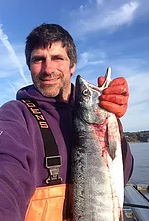Washington tribal leaders released a series of videos endorsing initiative 1631. Tribes were integral in crafting the initiative to ensure it works well for rural and resource-dependent communities. They brought their wisdom and their muscle to the table and really improved the final result.
Tag Archives: 1631
Fight Ocean Acidification: Yes on WA Initiative 1631
This commentary appears in the October 2018 issue of Pacific Fishing magazine
By Matt Marinkovich
 In the mid-1980s, when I started seining with my dad for Fraser River sockeye, the Puget Sound fishery was already declining. But lately the consequences of a fraying marine food web are spreading far beyond the fishing fleet. Living in Friday Harbor, I have a front row seat.
In the mid-1980s, when I started seining with my dad for Fraser River sockeye, the Puget Sound fishery was already declining. But lately the consequences of a fraying marine food web are spreading far beyond the fishing fleet. Living in Friday Harbor, I have a front row seat.
That’s why I will vote for Washington’s Initiative 1631 in November. This ballot measure will deeply reduce the biggest source of pollution that degrades our waters: carbon dioxide (CO2) from burning coal, oil and gas.
I’ve experienced some of the harm first hand. Local salmon stocks kept dwindling, so like many fishermen I migrated north. Now I fish in Bristol Bay, while back home whale watch boats and yachts have replaced fish boats in the harbor. Now they are worried too.
The endangered southern resident Orca whales aren’t getting enough fish to sustain themselves. These whales haven’t successfully raised a calf in over three years.
Is anyone surprised? Our resident orcas eat almost exclusively Chinook salmon. Just since I was a teenager, catch and escapement of these fish have dropped by more than half. Chinook in Puget Sound are down to about 10% of historic levels.
Scientists say the young Chinook themselves may be starving, especially when they first enter the Sound. November’s ballot measure offers a chance to tackle what might be the biggest problem —while we still can.
Carbon dioxide from burning fossil fuels mixes into the water and acidifies Puget Sound. Scientists at the UW Labs in Friday Harbor have measured CO2-driven acidification at extremes that most marine waters aren’t expected to see for generations. It is dissolving the shells of tiny floating snails called pteropods, a major prey for young salmon. High CO2 and warm waters are fueling toxic algae that displace nutritious plankton eaten by salmon. Toxic algae are also forcing harvest closures in Dungeness crab and shellfish beds. Scientists say the impacts will keep getting worse until we confront the root cause.
Not every attempt to “cure” this problem deserves support from fishermen. Initiative 1631 does. It is a powerful and affordable tool to slash the underlying CO2 emissions.
Fishermen and tribal leaders intervened to improve this ballot measure, so resource-dependent coastal people get a fair shake. The Working Group on Seafood and Energy, the only fisheries trade association focusing on carbon emissions, endorsed the initiative and provided a lot of information for this article.
The measure will achieve deep emission cuts at low costs. It will also help fishermen and others afford to do their part, instead of just sticking them with a bigger fuel bill. This initiative will impose a modest “carbon price” on most fuels. Then it uses the money to fix the problem—investing it to help ordinary people boost fuel efficiency, reduce emissions, and adapt.
This is a much stronger, fairer approach than the “carbon tax” (and mis-targeted revenue giveaway) that Washington voters rejected in 2016. I-1631’s “price and invest” approach provides funding that communities and businesses can use to build solutions that also benefit local industries. The money can build cold storages in coastal communities to eliminate trucking fish hundreds of miles to facilities in urban centers; retrofit vessels and vehicles to make them more fuel-efficient; and protect carbon-storing forested watersheds to ensure stable water supplies and draw down carbon.
Fishermen and tribes insisted on strong measures to ensure carbon revenues won’t be diverted and squandered. Now the initiative includes multiple layers of accountability, starting with the mechanism for collecting revenue: it’s a fee, not a tax. Legally, that means the money can only be spent to reduce emissions or to help people adapt to the impacts.
Marine fuels are exempt from the extra carbon price, so fishermen won’t pay a dime more at the fuel dock. Other fuels will be charged $15 per ton of carbon (around 14 cents a gallon of gas or diesel). That price rises at $2 (per ton) a year, with the proceeds invested in solutions. The price stops rising in 2035 if the state is hitting its emission targets, which it should, since most of the money will go directly into emission reductions.
This fee-based policy makes way more sense than the “carbon tax” voters rejected in 2016. This time, the initiative won’t give away money for tax breaks for big business and unfocused “rebates” to low-income people. Instead, I-1631 dedicates the revenue to actually fix the problem— isn’t that where the money should go?
Washington isn’t going it alone. Dozens of countries (including China) and state and local governments that represent about half the world economy have already enacted similar “price-and-invest” policies. That’s the kind of teamwork it takes to make a difference.
Killer whales and fishermen share a common interest in making sure the ocean can continue to support the fish we hunt. We need a strong, fair policy that will cut emissions. We need a policy like Washington’s I-1631.
Matt Marinkovich grew up fishing sockeye salmon on Puget Sound, fishes Bristol Bay today, and runs Matt’s Fresh Fish, selling direct to consumers and restaurants. He is an active advocate for a healthy Salish Sea.
Note: Global Ocean Health’s Brad Warren, on behalf of the Working Group on Seafood and Energy, worked with Matt Marinkovich to provide policy research and analysis for Matt’s article
